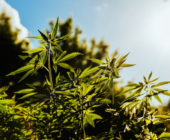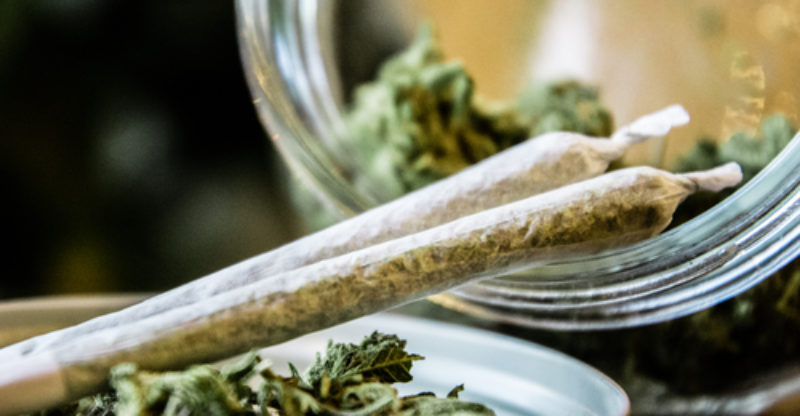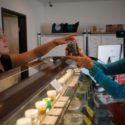Report from Washington:
Walking into the Have A Heart retail pot store in downtown Seattle can be an overwhelming experience. Not only is it perpetually busy – its location within walking distance of both the Space Needle and Pike Place Market keeps a steady stream of tourists walking through the front door – but there are thousands of different products to choose from once you are inside. On any given day you’ll see groups of people scanning back forth across different grams of Blue Dream and Alien OG, weed candies, and cannabis concentrates.
How does a customer wade through the thousands of different products and arrive at a possible choice? For many people – tourist or local – it isn’t a brand or specific product that catches their eye, but rather a sales person, referred to as a budtender, that guides them to what they are going to buy.
“Budtenders absolutely drive customer’s decisions,” said Brian Yauger, president of Lemonhaze.com. “Because this is still a new industry many consumers are still walking into recreational cannabis shops with no idea of how many options are available.”
LemonHaze.com uses retail data to track Washington’s cannanabis market and Yauger said it’s widely understood in the industry that budtenders can have a huge influence over consumer choice.
During a rainy Friday afternoon almost every single person leaving Have A Heart’s downtown store said they purchased products that were recommended by the budtender staff. One customer, who said her name was Lisa but declined to give her last name, said she can’t keep up with all of the different pot brands for sale.
“It’s not like I am going to really know all of the brands in the store, so I just ask the budtender, and look through what they bring out,” said Lisa, who had purchased three different individual grams of flower. “It usually works out pretty well.”
“Budtenders are a huge part of the experience, there’s no question that they are the face of the industry,” said Ryan Kunkel, a co-owner of the Have A Heart retail chain.
Jade Stefano, the founder of Puffin Farm, a pot farm about 100 miles East of Seattle, said she frequently sees how much power budtenders have over customer’s purchases.
“They are the gatekeepers of what people actually buy, people just buy whatever the budtender suggests,” Stefano said. “Probably 7 out of 10 transactions I see is the budtender presents two options chosen at random after the customer gives some vague description, and then the customer just chooses between the two.”
Stefano’s description of the buying process was repeated by multiple budtenders interviewed for this story. The typical exchange between the budtender and the customer starts with the customer offering a simple description of what they want – perhaps “an eighth of Indica flower” or “some pot candy” – and then the budtender coming back with a few different options. The average customer then simply chooses between what was presented in front of them, overlooking what could be hundreds of other similar products in the store.
Annie Masuda, a budtender at Ruckus Recreational, a pot shop in Seattle’s trendy Capitol Hill neighborhood, said the customers almost always pick from her recommendations.
“The majority pick from what I’ve selected for them, it’s super rare that I recommend something and they get something entirely different,” Masuda said.
Pot’s status as a brand new legal product plays a huge role in these interactions. Many customers, even those that were buying on the black or medical markets before legalization, come into a pot store with less education than they would for other products, say craft beer or wine. Combine that with the often confusing and even contradictory jargon used by pot companies to describe their products and it is hardly a mystery as to why many customers look to budtenders to make a decision.
The sheer scale of different weed companies and products for sale in Washington probably adds to the difficulty. Washington is the only state with recreational cannabis where pot stores cannot be owned by pot farmers or pot processors. This division between the production businesses and retail stores has led to a huge array of different brands and products – Washington has more pot brands and products than Oregon and Colorado combined. The Colorado-based data firm BDS Analytics, tracked 1,083 cannabis brands producing over 45,000 unique products during one 12-month span in Washington. Colorado had only 274 brands producing about 11,000 products, while Oregon had 431 brands making about 10,000 products
Some retail stores limit how many products they have, offering only a handful of farms. But many, like Have A Heart, stock a wide array of companies; Kunkel said Have A Heart has between 2,000 and 2,800 different products in each store location.
Yauger said pot brands in Washington understand the power budtenders have over sales.
“The brands are well aware of this and they spend lots of time and money trying to get budtenders to point consumers to their products,” Yauger said.
Stefano said one of the difficulties of Washington’s marketplace, which sold over $764 million in products last year, is getting budtenders to pay attention to your products and explain them to customers. Stefano said many budtenders in Washington think outdoor cannabis is less powerful or lower quality than indoor, and that feeling gets passed on to the customers. Stefano, who runs an outdoor farm, said she has focused on educating budtenders about sustainability and outdoor pot as a way to increase sales.
“I’m working on an event to get some budtenders in to educate them on sustainability and how outdoor can create more terpenes and be more flavorful,” Stefano said.
Kunkel said his business has also focused a lot on educating budtenders. His retail chain employs over 150 budtenders so the business created a video training system that includes interviews with farmers and processors. Katie Miller, the training coordinator for Have A Heart, said they have noticed a direct correlation between budtenders learning about a farm and that farm’s sales.
“We’ve noticed the difference in the knowledge of the employees, every time we do an education vendor video they understand what they’re selling and then they sell their product more,” Miller said. “The more knowledge they know the more confident they are in the sales floor.”
Bill Eddy, a manager at Ruckus Recreational, said taking different samples home and actually smoking the product is one of the best ways to educate budtenders.
“I encourage the budtenders to take the samples home and try them,” Eddy said. “It’s just like wine, the more wine you drink the more knowledgeable you are, the more pot they smoke the better their palate is and the more they’ll understand about what they do or do not like.”
Eddy said he prefers to hire budtenders that have retail experience, but he doesn’t look for someone with a lot of knowledge about pot.
“As far as their knowledge of cannabis, like anything it can be taught. In many cases the ones that are coming with reported knowledge, usually they’re misinformed,” Eddy said. “In my estimation sometimes it’s better that they know less, that they haven’t already been fed a lot of misconceptions.”
A good budtender is able to cut through the noise of the marketplace and find the right product for the right customer. And a bad budtender is able to do exactly the opposite – give a customer the wrong product that leaves them with an experience that might stop them from ever returning to a legal weed store.
That’s a lot riding on a profession that wasn’t even legal five years ago.
Lester Black is a freelance journalist based in Seattle, Washington. He is The Stranger’s cannabis columnist and his work has appeared in a range of publications, including Popular Mechanics, The Albuquerque Journal, The Tennessean, and Seattle Weekly. Find him on Twitter @leddder.








